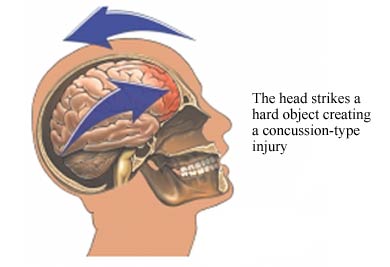
From the illustration above, we learn a precious lesson. Accidents or incidents can happen anytime, anywhere even under our supervision. The risks are similar in any range of age although brain injuries that occur in younger or older stage may result in more serious impacts. Young people, too, are exposed to these risks. Consider footballers, basketball player, and other athletes or physical activities fanatics. Without proper protection, they can get hit; bumped or fallen that makes their brain susceptible to severe injuries. Concussion is a type of brain injury that eliminates the brain’s capacity to perform some functions for a short period of time. This is a kind of accident that can affect sportsman. How to notice it? Learn carefully the concussion symptoms below.
Concussion Signs
Concussion is mostly caused by a blow to the face, head, and/ or neck. Vigorous shaking can also make this injury. When people suffer from crash, accidents, fell and other physical heavy bumps during sporting or performing outdoor activities, concussion symptoms may occur. The general signs that appear include:
• feeling confused right after the accidents or incidents
• suffering from temporary amnesia or disorientation, that make them unable to give some simple information like some place or the name of the day
• fell dizzy and followed by ringing ears
• difficulties in speech or verbal ability
• feeling nausea
After several hours, more symptoms may occur:
• difficulties in concentrating or remembering some facts and information
• mood changes and sleeping disorder
• increasing sensitivity towards sounds and lights
Usually, the concussion symptoms will end between six to twenty four hours after the first signs occur. However, when the symptoms still exist, there might be more serious conditions. When the incidents happen to a child, intensive care and observation are needed.
Diagnoses and Treatment
The diagnoses and treatments are based on concussion symptoms observation. Physicians will take a standard procedure of checking out pupils and throwing out some questions. This is not meant to make the sufferer more tensed but to recognize any memory loss. When required, a series of tests can be recommended to help physician to detect the injuries. The required tests are normally MRI, EEG and CT scan. The first treatment usually requires patient to rest totally. Medication is given to help calming the symptoms.
